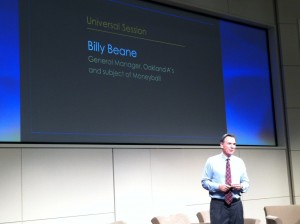
SAS is hosting the second annual SAS Financial Services Executive Summit today at SAS global headquarters with executive leaders from the banking, insurance and capital markets industries. The theme of the show is "Ignite," which references coming together, sparking innovation and inspiring change. The keynote speaker is a very well known change agent - Billy Beane.
Billy Beane is the general manager of the Oakland Athletics baseball team, whose story is told in the book and film "Moneyball." Billy is known for bucking conventional wisdom regarding success in baseball and by finding value in undervalued assets. And it turns out that a key part of his strategy has been to use analytics, and his approach has now become a best practice in sports franchise management.
My colleague Waynette Tubbs summarized his key points in her post on the SAS Knowledge Exchange, and my goal here is to build on Waynette's post to call out the main lessons for marketers. Here are my top 5 "Moneyball" lessons:
- A good way to drive innovation is to be clear about what you want to accomplish and do not get stuck in the rut of doing things the way they've always been done. This is surprisingly harder to do than it is to say, but worth the effort. It applies to almost any situation in marketing or business in general - start by defining your end goal, and then make sure you can measure the results. We've all heard it before, but it's worth repeating.
- Filter out the noise and stay focused on what you're trying to accomplish. Billy referenced how for baseball, the chatter in the daily press and broadcast media can be easily distracting and "you're kidding yourself if you think 'the noise' doesn’t affect you." This is where marketers may need to focus on finding the right filters because the nature of our jobs is to be engaged and keep a pulse on our market - that unfortunately puts us in the prime position to be bombarded by noise. What's the "noise" in your part of the business?
- Business is like baseball in that there are finite, measurable business parameters that make great candidates to apply analytics and derive insights not readily apparent. Understanding which of those parameters relate most closely to your core business is a key success factor in applying customer analytics.
- Go ahead and take risks, but contain them. Billy pointed out how most players at Oakland are only on one year contracts because that’s a key way they balance the risk of getting players that are undervalued.
- Healthy teams are successful ones. In baseball, there’s a correlation between incidence of injuries and sub-optimal team performance. Since great marketing is almost always the product of collaboration and other team efforts, it's not a far stretch to see how this one also applies to marketing.
Billy Bean's story which became the movie, "Moneyball" was all about maximizing limited resources. In that regard, it's a great story about optimization, for which the key is to find the one factor that matters most and focus on optimizing that. For Billy, the question was, "Which skills correlate most strongly to winning games?" The answer he found was getting players on base, so the Oakland As focused on that skill to drive their success.
What drives your marketing success? I'll bet that customer analytics can help you find the answer. Check out this paper for a great story about how marketing optimization makes a difference.

2 Comments
Pingback: Check assumptions to be sure you understand the customer - Customer Analytics
Pingback: Seven ways for marketers to respond to big data, from Brian Solis - Customer Analytics